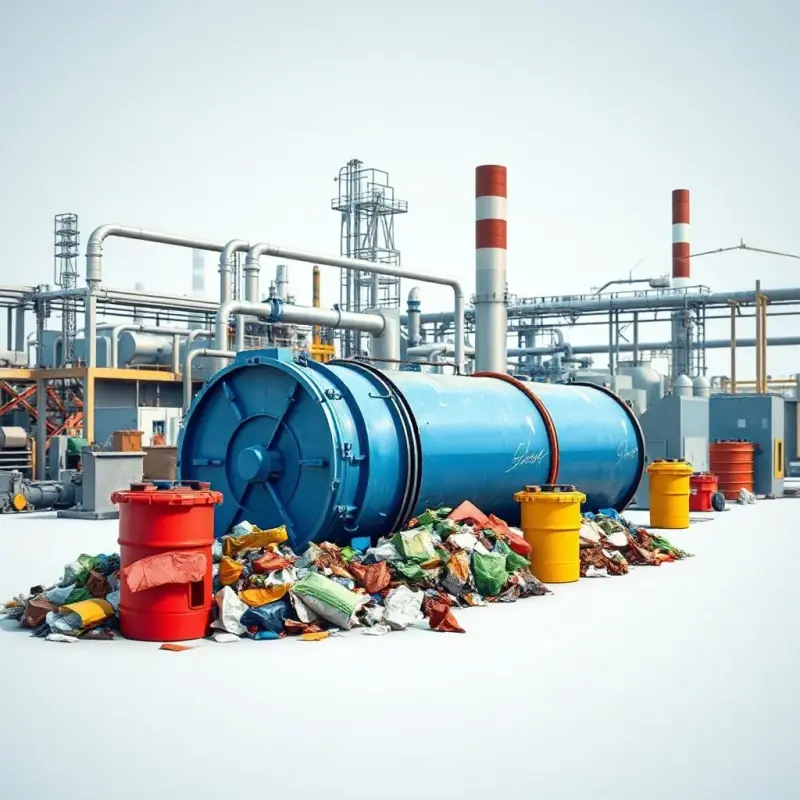Eco-Friendly Waste Disposal Technologies in Industrial Enterprises: Minimizing Pollution
Industrial enterprises are significant contributors to environmental pollution due to the substantial waste generated during manufacturing processes. Implementing eco-friendly waste disposal technologies is essential for minimizing pollution and promoting environmental sustainability. This article examines various sustainable waste management practices and their role in reducing industrial pollution.

1. Waste Minimization and Source Reduction
The most effective strategy for waste management is to prevent waste generation at its source. This involves optimizing production processes to use materials more efficiently, thereby reducing the volume of waste produced. Techniques such as lean manufacturing and process re-engineering can identify and eliminate inefficiencies, leading to less waste and lower environmental impact.
2. Recycling and Reuse
Recycling involves processing waste materials to create new products, reducing the need for virgin resources and decreasing landfill usage. Industrial enterprises can implement closed-loop systems where waste materials are reintroduced into the production cycle. For example, metal scraps can be melted and reused, and plastic waste can be reprocessed into new plastic products. This approach conserves resources and reduces pollution associated with raw material extraction and processing.
3. Waste-to-Energy Technologies
Waste-to-energy (WTE) technologies convert industrial waste into usable energy forms, such as electricity or heat. Processes like incineration, gasification, and anaerobic digestion break down waste materials to produce energy, reducing the volume of waste destined for landfills. Modern WTE facilities are designed to minimize emissions and capture pollutants, making them a cleaner alternative to traditional waste disposal methods.
4. Bioremediation
Bioremediation utilizes microorganisms to degrade hazardous substances in waste, transforming them into less harmful compounds. This method is particularly effective for treating industrial effluents and contaminated soils. By employing naturally occurring or engineered microbes, industries can detoxify waste streams, reducing environmental pollution and health risks.
5. Advanced Filtration and Separation Technologies
Implementing advanced filtration systems allows industries to separate valuable materials from waste streams for recovery and reuse. Techniques such as membrane filtration, centrifugation, and electrostatic separation can extract metals, chemicals, and other resources from waste, reducing the need for new raw materials and minimizing environmental contamination.
6. Sustainable Packaging Solutions
Industries are adopting sustainable packaging materials to reduce waste generation. Biodegradable, recyclable, and reusable packaging options help minimize the environmental footprint of products. By designing packaging that requires fewer resources and generates less waste, companies contribute to pollution reduction and resource conservation.
7. Implementation of Circular Economy Principles
The circular economy model emphasizes keeping resources in use for as long as possible through recycling, reusing, and remanufacturing. Industries adopting this model design products with their entire lifecycle in mind, ensuring that materials can be recovered and reused at the end of their useful life. This approach reduces waste generation and promotes sustainable resource management.
8. Adoption of Green Chemistry
Green chemistry involves designing chemical products and processes that reduce or eliminate the use and generation of hazardous substances. By selecting safer raw materials and developing environmentally benign synthesis methods, industries can minimize the environmental impact of their operations and reduce the toxicity of their waste streams.
9. Utilization of Digital Technologies for Waste Management
Digital technologies, such as the Internet of Things (IoT) and artificial intelligence (AI), enable industries to monitor and optimize waste management processes. Smart sensors can track waste generation in real-time, allowing for immediate corrective actions. AI algorithms can analyze data to identify patterns and suggest process improvements, leading to more efficient resource utilization and waste reduction.
10. Employee Training and Awareness Programs
Educating employees about sustainable waste management practices is crucial for successful implementation. Training programs can instill a culture of environmental responsibility, encouraging workers to adopt eco-friendly practices in their daily tasks. An informed workforce is more likely to identify opportunities for waste reduction and contribute to pollution minimization efforts.
In conclusion, the integration of eco-friendly waste disposal technologies in industrial enterprises is vital for reducing pollution and promoting environmental sustainability. By adopting practices such as waste minimization, recycling, waste-to-energy conversion, and bioremediation, industries can significantly lessen their environmental impact. Embracing these technologies not only benefits the environment but also enhances operational efficiency and corporate responsibility.
Articles
Register for our notifications and have the newest and most intriguing articles sent directly to your email.